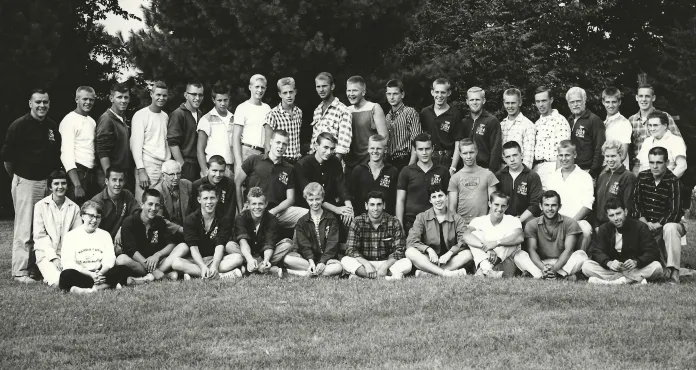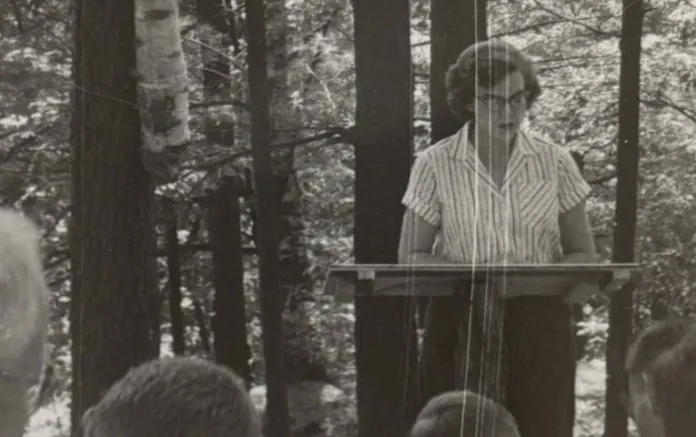70 Summers Later: The Enduring Legacy of Camp St. Croix
How a group of alumni were shaped by camp and became bound by brotherhood
As featured in Letters from Camp Magazine – Fall 2025.

Seventy-some years have passed since they were staff members at YMCA Camp St. Croix. Back then, they were tasked with leading canoe trips, singing songs, wrangling homesick kids, and performing a million other duties required at camp. They didn’t know it at the time, but they were forging something lasting: a brotherhood built in pine forests and around campfires, a loyalty shaped by shared experience, and a reverence for the men who led them all.
Now in their 80s, this group of alumni still meet up, despite the natural dwindling of numbers caused by the march of time. Some people are less mobile, and some have passed away. There are still a number of active members, though, who remain connected through regular emails with the group. When “Letters from Camp” asked to tell their story, responses flooded in. These men were eager to share their memories and love for camp and each other. They spoke of those days with a quiet kind of awe, recalling their first real sense of purpose.
This is their story. Of laughter and leadership. Of growth and grit. Of a camp that gave them more than just memories — it gave them each other.
The men who led them
Every summer from 1950-57, Camp St. Croix would come alive with the wind in the trees, the chirp of the birds, echoes of laughter across the main field, and the reassuring voice of Jerry Manlove.
To campers, he was a legend. To the counselors, he was more than a boss: he was a mentor, a compass, and sometimes, a quiet anchor during the stormy summers of adolescence. And yet, Jerry himself was only 24 when he arrived at camp. Phil Fabel, whose dad was chairman of the board at the time and the one who hired Jerry, remembers, “Camp wasn’t going great. The board took a chance on Jerry. And forever after that, [my dad] loved Jerry like a son.”
Jerry believed camp was more than canoeing and field games: it was a place to build character, empathy, and confidence. But the real magic wasn’t in the way he ran camp, it was how he empowered the counselors. He saw the staff not for who they were, but for who they could become, entrusting them to problem-solve and lead — not because they were fully prepared for this level of responsibility, but because he believed they would rise to the occasion.
A memory that so perfectly captures Jerry’s leadership style was shared by Paul Chapman, who was 15 years old when he was hired as the camp truck driver.
“I couldn’t even drive the family car, but I was responsible for the camp truck. On one of my first days, I stopped for the mail and slid the truck into a ditch. I grabbed the mail, hiked a mile in the rain back to camp, walked into Jerry’s office, and said, “Truck’s in the ditch.” He just looked at me calmly and said, “You got it in there, I’m sure you will get it out.” I then gathered a group of counselors together, and we managed to get the truck unstuck. There was no doubt in Jerry’s mind that I would figure it out. He treated everyone that way; he treated everyone equally. He recognized and respected us equally for whatever contribution we made. And ultimately, Jerry changed the way we saw ourselves and each other.”
From Jerry to Jack
When Jerry left Camp St. Croix in 1957, he passed the torch to Jack Murdock. Jack had been the waterfront director and one of Jerry’s close friends, and with this seamless leadership transition, set about establishing his own legend, honoring Jerry’s legacy while adding his own touch.
Jack’s strength was in facilitation. He saw the camp not just as a sacred space, but as a living system. He built new trails, cleared new fields, renovated existing cabins, and constructed new ones. He forged partnerships with local businesses, and the neighbors came to see the camp as part of the community. Counselors under Jack learned how to create solutions and produce outcomes. They learned how to build, fix, plan, and lead. Just as with Jerry, they were expected to grow personally while also fostering the growth of the campers.
Where Jerry taught them to believe in themselves, Jack taught them to believe in each other. Jack was the director from 1957-77.
As evidenced by the legacies each of these leaders created during their tenure at Croix, the greatest directors don’t just run camps: they shape lives.
Through their eyes
For the young men who worked for Jerry, and later, for Jack, camp was where they learned to lead. It wasn’t just about making sure campers got to archery on time. It was about showing up for each other, and for the kids.
Dick Carlson remembered, “I came to camp lacking in confidence about myself, and put my bedroll on that bunk, saying, “Dear God, please help me,” and then I went out and lived life to the fullest. You find your life when you lose it for others. Every day at camp, this was the way we were called to live life — for the kids! We watched those boys grow, and somehow, so had we.”
Paul Chapman chimed in, saying, “I went and found a mystical land. I was 14 years old, and my contribution was accepted equally. I was given responsibilities, expected to succeed, and left on my own to figure out how to make it happen. We were valued, listened to, and trusted.”
Paul Rick added, of his experience on staff, “the many ways that Camp St. Croix has enriched and strengthened the lives of so many individuals is perhaps its greatest legacy.”
Inspiring alumni to stay connected
The experience of working for Jerry and Jack has proved so transformative that these former staff have adopted the directors’ surnames: they are the Manlove/Murdock alumni, as surely as they are alumni of the camp itself.
Over the years, dozens of staff worked for Jerry and Jack. Many kept in contact with one or both of them, as well as with each other. But in 2006, Jerry called Paul Heffron to let him know he would be in town visiting. “One thing led to another, and word spread. Instead of a few of us getting together for coffee, it turned into a full-fledged reunion with over 40 former staff.”
In 2007, ’08, and ’09, additional reunions came together. In 2010, approximately 60 staff alumni would come together annually. Paul explained, “By 2009, we had an email list of 65 of the 85 total staff that had accumulated since our first reunion in 2006. I raised the question, ‘What should we do with all this stuff in our archive?’”
The answer was quite simple: a book. In 2010, Paul Heffron compiled and edited “Remembering Camp St. Croix: the Manlove Years 1950-57.” The book was about the members of the 1950s camp staff, their camp experience, and its significance in their lives. It was written and illustrated by the members themselves.
Paul wrote, “What ties us all together is the experience of being on the staff at Camp St. Croix and being influenced by its director. The experience and influence had a profound effect on our lives. We hope that our group and the book will demonstrate for others that their camp experience and friendships are of special significance in their lives. We hope that we have shown what a camp alumni group can become and how it can support its camp.”
From the book came more reunions, including staff who worked under Jack Murdock as well. The email list expanded to include regular communication with its members.
70 years later
Now, many of those once-young counselors are in their 80s and 90s. But when they talk about camp, there is still a youthful gleam in their eyes.
They still remember Jerry’s voice at dusk, calling them to reflect.
They still hear Jack’s hammer, early in the morning, fixing what needed fixing.
They all speak of a brotherhood built on early mornings, late nights, scraped knees, and inside jokes. They talk about how connected they were to each other, to nature, to something simpler and truer. Seventy years later, the camp is forever etched in their hearts. The weight of tradition, the joy of connection, the power of presence.
They thought they were simply leading campers, but they were also finding themselves.
In Memoriam, and in Gratitude
Camp St. Croix was an all-boys camp until 1974; thus, the majority of the Manlove/Murdock alumni are men. But there were a few women on staff. One notable woman was Audrey Weldon Johnson who was on staff in 1952-53. She was featured in “Letters From Camp” in October 2024.
Audrey was passionate about Camp St. Croix and proud of her time on staff. She was an avid photographer and archivist with scrapbooks filled with photos from camp. Paul Heffron’s book “Remembering Camp St. Croix: the Manlove Years 1950-57” used many of her photos.
Audrey passed away in March 2025. At 96, Audrey had lived a rich life spent surrounded by her large family and community of friends. She was married to her husband Roy for 59 years before his death in 2014, and had a 20-year career with Burlington Northern Railroad. She was the “go-to” person for planning events and even wrote “The Road Back Home,” a guide to planning reunions. She was an active volunteer, passionate about several hobbies, and beloved by many.
Her life was full of activity, accomplishments, and love, and 72 years after working at camp, that experience was still so meaningful that it was mentioned at her funeral. Her camp photo albums were proudly displayed, along with so many of the artifacts from an inspiring, fulfilling lifetime. Memorial gifts received were directed to Camp St. Croix.
In preparing this story, once again, her photos were used to document the legacy of these years of Camp St. Croix.
Thank you to Audrey’s family for lending us her photos.
